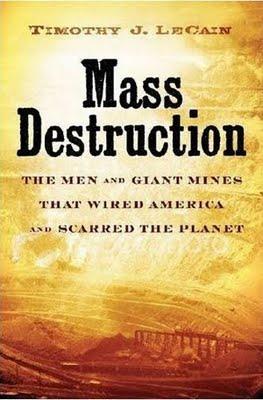Mass Destruction: The Men and Giant Mines that Wired America and Scarred the Planet

In Mass Destruction, Timothy J. LeCain carefully examines the industrial open-pit mining industry in America, and its technological, social, and environmental impact on our modern world.
Full disclosure: Books like this have a tendency to take my enviro-angst to a whole new level. I consider myself concerned with environmental issues, but I clearly have not yet reached Colin Beavan (a.k.a. did-not-use-toilet-paper-for-a-year-man) levels of environmental virtue. I would say that I have a moderate to high level of "impact guilt"; I carpool, but feel bad for not owning a hybrid or taking the bus. I recycle, but feel remorseful for buying food with lots of packaging. Mass Destruction took me from a vague kind of guilt when throwing my towels into the dryer straight to an appendicitis-like pain when thinking of all the copper wiring that has made my lifetime of electricity use possible.
If you have never seen pictures of the Bingham Pit Mine outside of Salt Lake City, Utah, its scope will definitely take your breath away. Measuring two and a half miles wide and three-quarters of a mile deep, the mine is one of only two man-made objects that are visible from space. LeCain sees this as fitting, “given that the astronauts’ technological home away from home in space would most likely contain copper, aluminum, gold, and other metals mined in open pits.” However, LeCain argues convincingly that the rise of technological innovation and efficiencies that sent Americans to the moon has also created the potential for the worldwide depletion of natural resources and irrevocable damage to ecologically important areas. LeCain describes the proliferation of “dead zones,” which are areas near pit mining operations that have been so besieged and exploited that they essentially become sterile, and even poisonous.
Even more alarming is LeCain’s assertion that as developing countries takes on American-style production and consumption habits, the environmental crises created by open pit mining will grow exponentially. Yet, in the fair-minded style LeCain uses throughout the book, he argues that America should not ask the rest of the world to abandon their lucrative mining operations due to environmental impact. Now that we have benefited from the mineral riches we have extracted, we cannot hypocritically expect the rest of the world to sit by and pass up the opportunity such technology provides to its people. The obligation of America, according to LeCain, will be in scientific advancement: finding ecologically sound methods for mineral extraction. His hope is that these advancements will provide an increased quality of life for people around the world.
I fervently hope LeCain is right that our future is one where technology and ecology coincide. However, barring the simultaneous worldwide vaporization of every iPod, Hummer, and coal-fired power plant, I have trouble believing humanity will ever be able to use earth’s resources with anything remotely resembling sustainability. But that could just be my enviro-angst talking.